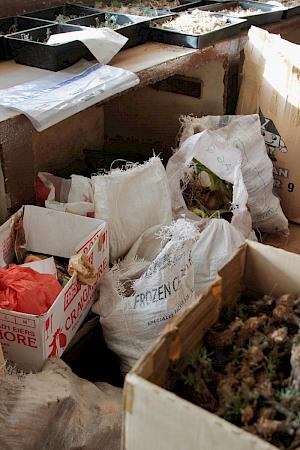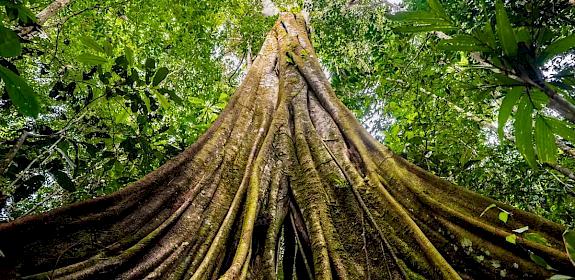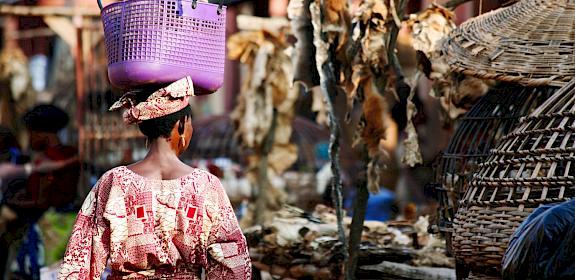Joint conservation and e-commerce action to urgently combat illegal plant trade
Wild plants are being illegally harvested at such a rate that, in many cases, their existence is now under threat, with most sales occurring on social media and ecommerce platforms. Demand for wild plants, such as ‘succulent’ plants, for homes and gardens across the globe has risen rapidly in recent years. Buyers are increasingly turning to online platforms to find plants, some searching for discounts, others looking for rare specimens.

TRAFFIC and the Royal Botanic Gardens, Kew, are working with eBay to develop a blueprint for its own and other platforms to strengthen online trading policies for the sale of plants and prevent illegal sales.
Work to engage multiple other e-commerce platforms is also underway.
TRAFFIC has been researching the illegal trade in native succulent plants from South Africa. Many of these plants, poached from the wild, end up for sale online around the world. Illegal trade can hide in plain sight, mimicking the legal trade in cultivated specimens grown by responsible plant growers.
Since 2019, more than one million illegally harvested succulent plants have been seized by law enforcement authorities in South Africa, following a dramatic rise in plant poaching to meet the growing demand. This illegal trade of native plants is destroying precious ecosystems, feeding organised crime, and depriving local communities of livelihoods.
The convenience of buying plants online has made it easier than ever before to bring nature indoors. Many buyers won’t be aware of the ethical, sustainability, and legal factors that underpin this trade. Many don’t realise that the availability of some plants online may be threatening the survival of the species in the wild.
Funded by the UK Government through the Illegal Wildlife Trade Challenge Fund, this new collaboration between conservation and e-commerce aims to improve the online trading landscape for the benefit of plants and plant enthusiasts alike.
“We really welcome this partnership with eBay, which is a critical first step in this exciting collaboration between conservation and e-commerce to protect the existence of many of these plants in the wild, the landscapes in which they grow and the millions of people who live in communities where these plants have thrived for thousands of years,” said Dominique Prinsloo, TRAFFIC Project Manager.
“To tackle the complex poaching and trade issues of today, we need to work collaboratively to address legislation, policies and detection around the online plant trade,” added Prinsloo.
Preventing the online sale of illegally harvested plants, while also supporting legal trade from responsible plant producers, poses both technical and regulatory challenges. We really appreciate eBay’s support in seeking ways to improve the transparency of online trade in succulent plant species, which can play a crucial role in helping to protect their wild populations, while also benefiting responsible buyers and vendors by allowing sustainable alternatives to thrive."
David Whitehead, Project Lead at RBG Kew
eBay looks forward to continued work with TRAFFIC and RBG Kew to explore opportunities to enhance communication to our customers about the domestic and international requirements for plant trade. This includes a test case for succulent plants from southern Africa."
Mike Carson, Senior Director, eBay Regulatory team
eBay has allocated significant resources to help prevent illegal wildlife trade on their platform. According to eBay, in 2023 it blocked or removed 500,000 items that violated its prohibited wildlife policies.
The company continues to apply more measures to strengthen its enforcement and expand prohibited wildlife policies to include a broader list of endangered species. Through its engagement with TRAFFIC and RBG Kew, this list will now include the addition of plant species traded on its platforms.

‘FloraGuard’ - innovation to help detect illegal online trafficking
A key tool at RBG Kew’s disposal is FloraGuard, a web-crawling algorithm developed in collaboration with the University of Southampton. By searching for keywords relating to the online trade in threatened plant species, the software can search for and identify online adverts which offer these species for sale. While human expertise is still required to evaluate search results, the use of such software provides a valuable shortcut for monitoring the online trade in wildlife products, and for detecting patterns in trade to inform conservation or trade policy actions.
Use of this technique will enable RBG Kew to better monitor the trade in threatened species across several online platforms, to highlight cases where advert content could be improved, and to monitor the impacts of other interventions, such as new trading policies introduced at platform level.
“Due to the sheer scale of online markets for plant products, the use of specialist search technology is a great aid to conservationists looking to keep an eye on certain species, and detect changes in horticultural trends. What we would like to see within plant adverts is far more detail about the provenance and production of the specimens offered for sale, as well as information on the requirements for CITES permits and phytosanitary certificates, which are frequently absent from advertisements posted online,” said David Whitehead, Project Lead at RBG Kew.
What can buyers do?
For plant lovers, the challenge is clear: how do we fill our homes with mood-boosting greenery, without unwittingly supporting unethical, unsustainable, and illegal trade? Before making a purchase, take a moment to consider these five essential questions in this guidance written by Dominique Prinsloo.
About Royal Botanic Gardens, Kew

With over 350 scientists, Kew’s mission is to understand and protect plants and fungi for the well-being of people and the future of all life on Earth. Kew’s structure, research and resources align to five Scientific Priorities, to help them achieve transformative change and maximum positive impact.
About IWTCF

The Illegal Wildlife Trade Challenge Fund (IWTCF) is a UK government competitive grants scheme aimed at eradicating the illegal trade in wildlife. The UK is committed to protecting endangered animals and plants from poaching and illegal trade. The IWTCF provides funding for practical projects around the world that help eradicate illegal wildlife trade and, in doing so, reduce poverty.





